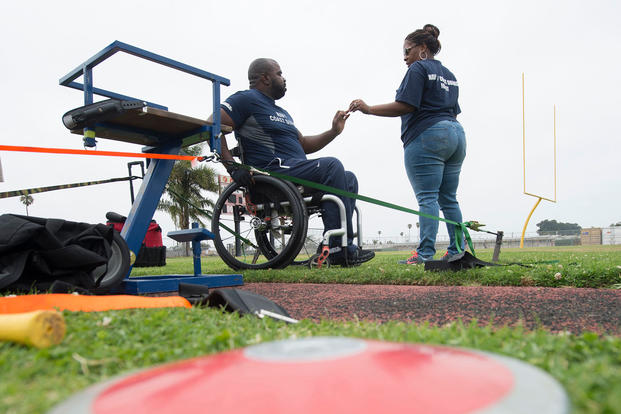Linda Bailey is wife and caregiver to a disabled Air Force veteran of Desert Storm, a current DAV (Disabled American Veterans) Department Service Officer and a DAV Auxiliary Past Department Commander for Tennessee.
In 1991, my husband Albert suffered several massive strokes while serving in the Air Force. Although I was just shy of crossing the 20-year mark with my employer and qualifying for retirement benefits, I was suddenly forced to quit my job to become his full-time caregiver as he worked through a painstaking recovery relearning to talk, walk and perform simple tasks like eating and dressing independently.
Now -- at age 62 -- as many people are starting to look forward to retirement, I have no alternative but to continue working to afford the high-cost caregiving expenses my husband needs. Albert is now able to be on his own for a few hours at a time, but aging has added new complexities to his service-connected disabilities and he still requires significant outside care, and that all comes out-of-pocket. But this would not be the case if he had served in the military just a decade later.
Unfortunately, this story is all too familiar for tens of thousands of veterans and their caregivers across the nation. Veterans injured after September 11, 2001 are eligible for an array of benefits and supports -- including respite care, medical training, health coverage and a monthly stipend -- through VA's Program of Comprehensive Assistance for Family Caregivers. But by law, those injured before that date are excluded from the program. This is simply unfair.
This isn't the first time I've stood witness to such hardships. Growing up I watched my mother tirelessly serve as caregiver to my father -- a disabled Battle of the Bulge survivor who was awarded two Purple Hearts -- all without any outside support or benefits. He died in 2002, but not before his care needs took a significant toll on my mother's health and finances.
In my current profession as a benefits counselor with DAV (Disabled American Veterans), I work to get veterans the full range of benefits they deserve. Day in and day out, I meet caregivers like myself who often struggle to get by, who willingly sacrifice their careers and livelihoods and whose health and wellbeing take a back seat to the needs of their loved one. And like my father, I have seen too many injured and ill veterans pass away without ever getting access to support programs they and their caregivers desperately need, all because of an arbitrary date.
There is, however, a ray of hope for our nation's heroes. In December, a provision with strong bipartisan support passed the Senate Veterans' Affairs Committee 14-1 as part of the Caring for Our Veterans Act calling for expansion of VA's caregiver program to severely injured veterans of all generations. Now we need lawmakers in the House and leaders in the administration to fully recognize that expanding the program is not just the right thing to do, but the smart thing to do as well.
A large part of this debate is over funding. But keeping seriously disabled veterans in their homes with family caregivers saves taxpayer money. The cost of supporting a family caregiver is roughly $37,000 per year, whereas care in a VA nursing home can run upwards of $400,000 annually. Veterans are also shown to have a better overall quality of life and greater health outcomes when care is provided by a family caregiver. Don't we owe disabled veterans -- no matter what era they served in -- the best chance possible at a fulfilling life?
The physical sacrifices made by my father, my husband and so many other men and women are no less significant than those made by veterans after 9/11, but under the current law they do not receive equal recognition or support. It's time to put a stop to the inequity.
For decades, veterans of the Korean, Vietnam and Gulf Wars have lived with adverse health due to their service-connected disabilities, and their caregivers have shouldered the weight of managing their care alone. Post-9/11 veterans deserve this benefit. But how can we look aging caregivers in the eye and tell them their decades of shared sacrifice mean less? And how many more veterans will die before we are willing to stand up and correct this injustice?
The window of opportunity is closing for many. Now is the time for action, as now may be all they have.
-- The opinions expressed in this op-ed are those of the author and do not necessarily reflect the views of Military.com. If you would like to submit your own commentary, please send your article to opinions@military.com for consideration.














